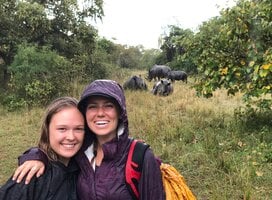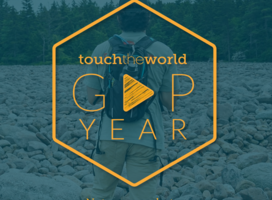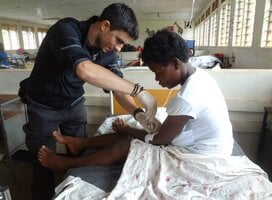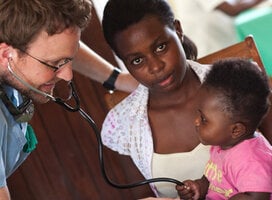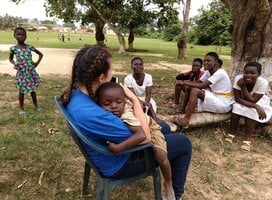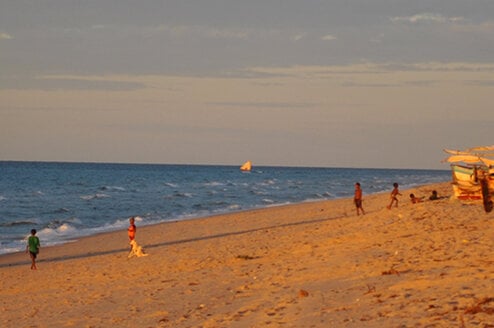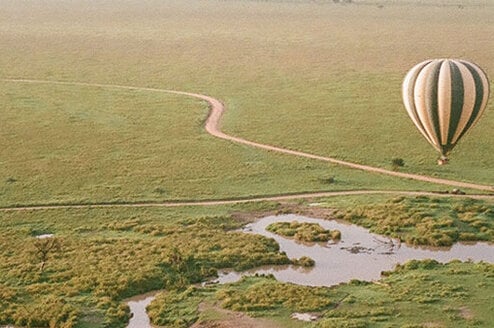Gap Year in Uganda
Take everything wonderful you’ve heard about Africa; now imagine it in one small, often overlooked East African country. Uganda offers the breathtaking scenery, the boundless opportunity for adventure travel, and the unrivaled happy spirit of people that Africa as a continent is notorious for. Backpackers rave about the lush and diverse landscapes from the Rwenzori Mountains to the Nile, and volunteers are overwhelmed with opportunities in Northern Uganda. In 1907, Winston Churchill proclaimed that Uganda was the ‘Pearl of Africa’…now go find out why!
From internships, to rafting the Nile, to volunteering, to gorilla trekking, there are endless gap year opportunities in Uganda. The best part? You can’t go wrong with any of them!
Volunteering
With options in education, human rights, childcare, and beyond, the volunteer options in Uganda are vast. Make sure to do research on various organizations to ensure that your volunteering experience will be worthwhile and you will be working alongside a sustainable and holistic volunteer program!
Adventure Travel
10 National Parks, 7 game reserves, more than 50 ethnic tribes, the Nile River, the Rwenzori Mountains—need I say more? Uganda is home to the Mountains of the Moon in Rwenzori National Park, the highest mountain range in all of Africa and a must-see. Murchison Falls is another tourist favorite, boasting the world’s most powerful waterfall and a wildlife reserve containing 2 of the ‘Big 5’. Bwindi is another sight that cannot be missed—the Impenetrable Forest at Bwindi National Park has one of the richest eco-systems in Africa and is notorious for its gorilla trekking tours (Bwindi contains half of the world’s population of the gravely endangered Mountain Gorillas). Jinja, located in Southeast Uganda is the source of the Nile, and boasts some of the world’s best white-water rafting and bungee jumping. The opportunity for tourism and adventure travel in Uganda is endless!
Internships
The abundance of non-profit organizations provides ample opportunity for learning what it takes to work in a developing country. Unpaid internships are commonly offered in Uganda, and are generally held on 6-month to 1-year contracts. You will be challenged, you will learn to be flexible, you will stretch your skills and comfort zones, and your worldview will be expanded. These internships are hard work, but they’re even more fun and will prepare you to take the next steps toward your life goals and dreams!
Make sure to conduct plenty of research on the places you will be traveling and the organizations you will be affiliated with—ignorance and travel do not mix well. Pack a tent, revel in your last hot shower, and take a plunge into the unknown!
Cost of Living in Uganda
The low cost of living in Uganda compared to other gap year destinations is a huge appeal for travelers on a budget. Living in larger cities such as Kampala can cost a pretty penny, which is why many opt for travel and living opportunities in more rural regions. In general, you should expect to budget approximately $500 per month. This includes household accommodations (~$200 per month for rent, utilities, guards and a housekeeper), cell phone and Internet (~$30 per month), food (~$100 per month), and travel/miscellaneous expenses (~$170 per month). Prices will vary depending on travel preferences and region. Always remember that no price is final—bargain, bargain, bargain!
Culture and Etiquette in Uganda
While it is certain that you will encounter countless cultural differences in Uganda, here are a few of the most important customs to get you started:
- “Sorry” is a term that is used arguably too much. You’re tired? Sorry! You tripped? Sorry! You drank too many Tuskers last night? Sorry!
- When speaking to someone, if they raise their eyebrows-that simply means “yes” or that they acknowledge what you are saying and you can continue talking. Most commonly confused with “hey, you’re pretty cute”. Don’t confuse the two-it gets awkward.
- When speaking with a local person, communicating in English is often perceived as extremely blunt. It is normal to be commanded rather than asked (i.e. “you bring to me”, “you come”, or “you give to me”). The term “please” isn’t used because there is no literal translation in the languages spoken in Uganda. So, don’t be offended! Yes, that was a command.
- Bargaining over prices is extremely common, and as a foreigner, you’ll find yourself doing a lot of it. The best tactic is to ask a third-party local what an appropriate price would be, and go from there. Remember that many times you’ll be haggling over a few cents in USD, so it’s not always a hill to die on.
Greeting others is an important part of the culture, and it is considered rude if you don’t take the time to do this. Greeting consists of a hand shake/high-five fusion that you’ll catch onto quickly and a few exchanged pleasantries. Embrace it—you’ll like it.
Health and Safety in Uganda
Uganda’s war torn past is reason to be a cautious traveler, but don’t let that scare you from exploring the country and learning why many consider it one of the most beautiful and welcoming travel destinations in the world! Learn how Uganda’s violent past contrasts so starkly with the beauty of the people, and prepare to have your life forever changed. That being said, here are a few safety precautions to keep in mind: don’t walk alone at night and only take boda-bodas that you trust. Basically, use travelers’ common sense!
Most importantly, make sure you are properly vaccinated before you leave. Yellow fever is the only mandated vaccine to enter the country, but it is additionally necessary to be up-to-date with routine shots and Hep A, Hep B, Typhoid, and Meningococcal. Be sure to talk to your healthcare professional to find out which malaria prevention method is the best option for you. Make sure that you are prepared with all routine prescriptions from home, as they may not be available in Uganda.
